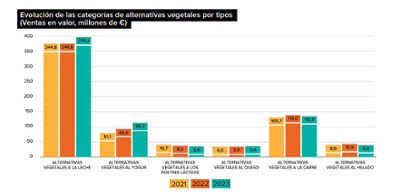

The veggie phenomenon experiences a turning point in Spain

The end of the pandemic has had a rebound effect on the population, according to Lantern's The Green Revolution report.
The veggie phenomenon (the sum of vegans, vegetarians and flexitarians) has slowed down in the last two years. According to the fourth instalment of The Green Revolution report, presented by the consultancy Lantern at the ICEX space in Madrid, almost 1,300,000 new veggies were incorporated in Spain in 2021, of which more than half (600,000) have been lost by 2023, mainly flexitarians, those who have an eminently vegetable diet, but occasionally consume meat or fish.
What is the reason for this decline? Lantern claims that the pandemic and confinement have increased people's awareness of health, the environment and animals. The end of these exceptional circumstances seems to have had a 'rebound effect' on a population hungry for pleasure and enjoyment in every way, including their diet.
Focusing on figures, the study points out that up to 4.5 million Spaniards over the age of 18 currently identify themselves as veggies, of which 3.5 million consider themselves flexitarians; 670,000 are vegetarians and around 276,000 are vegan consumers. The number of vegans and vegetarians has grown by 10% since the last edition and is approaching one million people.
"At Lantern we remain positive about the plant-based trend in the medium and long term, due to the combination of factors such as the growing adoption of conscious consumption habits, especially among young people; the notable improvement in satisfaction with the category; and the arrival of new technologies that will allow us to create new winning products," said Jaime Martín, founding partner and CEO during his speech at the presentation ceremony.
The veggie consumer profile
The profile of the plant-based consumer once again places women as the main drivers of this trend. Women account for 59% of veggies and 74% of vegetarians and vegans. The main reason for this is their concern to put health and wellbeing first. Not surprisingly, the decline in the practice of plant-based diets has been mainly among men, both among vegans and vegetarians, where there has been a slight decrease, and especially among flexitarians.
Although the movement is represented across a wide spectrum of age ranges, the highest penetrations are found among young people under 24, where 16% follow veggie diets. They also lead the penetration of vegetarian and vegan diets, with 4.8% and 1.9% respectively. A second group to be highlighted is the population aged 55-64, where 13% of veggies are found, mainly flexitarians, with lower rates of vegans and vegetarians. The study also highlights at the opposite end of the spectrum the "super carnivores", who say they love meat and eat it every day and account for 12% of omnivores.
Finally, as far as the capillarity of this movement is concerned, the veggie phenomenon is increasingly spread throughout Spain, although it is most concentrated in the metropolitan areas of large cities and in cities with less than 100,000 inhabitants.
Falling sales of plant-based products
This loss of momentum in the trend and adoption of veggie diets has also been reflected in the sales figures for plant-based products. In the last year, only plant-based alternatives to milk and yoghurts have maintained their growth. On the other hand, plant-based alternatives to meat, fish, cheese and ice cream have fallen in sales volume, according to Nielsen IQ data as of June 2023. Specifically, vegetable alternatives to meat have suffered a drop of 3.4% in value and 7.8% in volume this past year, standing at 114 million euros and 8,848 tonnes sold respectively.
These figures place the plant-based sector in limbo, with a long way to go in terms of growth figures and the number of followers of this category.





